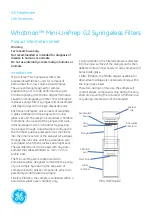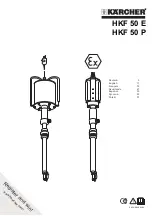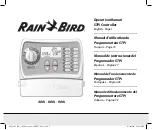
Hozelock Cyprio Ecocel garden pond
filters can be sited almost anywhere.
(See a,b,c Fig 1) and teamed with the
appropriate pond pump, they will remove
unwanted solids from the water and convert
dissolved organic and chemical fish waste into
harmless compounds. In addition, these filters
combined with UVC units will give
guaranteed clearwater, if the advice given in
the Hozelock Cyprio Filter Equipment
Selection Chart and on these instructions is
adhered to.
SAFETY
! This product is
NOT SUBMERSIBLE
, and
should be sited where it cannot fall into the
water or become waterlogged. However, the
design is weatherproof, and Ecocel filters can
be safely installed outdoors.
! Important – This product is not suitable for
use in direct sunlight over long periods of
time.
! Protect from frost. In cold winter weather,
when fish are not active and algae growth
ceases, the unit may be drained of water,
removed (if possible) from its installation and
stored in a dry, frost-protected area.
SIZING THE EQUIPMENT
The Filter Equipment Selection Chart overleaf
gives general guidelines on the specifications
of pump, filter, UV and flexible hose diameter
for garden ponds up to 20000 litres (4400
gallons), with stocking options for goldfish or
Koi. For best results the following condition
factors must also be taken into account.
DEPTH
Hozelock Cyprio recommends a minimum
depth of 1.2m (4’) for Koi ponds. For a pond
with an average depth of less than 0.75m (2’
6”) the Condition Factor is + 25% (ie add 25%
to the pond volume if less then 0.75m deep)
Shallow ponds are subject to full penetration
of sunlight, and warm up quickly. This
encourages the growth of algae.
LOCATION
Pond location determines the daily amount of
sunlight or shade a pond receives. Ponds
exposed to full sunshine throughout the day
have a Condition Factor of +25%.
CLIMATE
Climate affects water temperatures and fish
activity rate/feeding requirements. The more
active the fish, the greater the demands on
the filtration system.
In hot climates (i.e. South Africa), the
Condition Factor is +35%
In temperate climates (i.e. Southern Europe),
the Condition Factor is +15%
In a Northern European climate (i.e. most
areas of Great Britain), the Condition Factor is
+0%.
EXAMPLE
You have a 2250 litres (500 gallon) goldfish
pond 0.6m (2’) deep (Condition 25%).
You live in London - a Northern European
climate (Condition 0%). The pond is
exposed to full sunlight (+25%). The effective
volume of your pond is therefore increased
by 50% (25% + 25%), and you would need to
size your equipment as though your pond
held 3375 litres (750 gallons)
1.0 INSTALLATION
Important:
The pump supplying this unit must not
have a maximum head exceeding 6m (3.8
PSI, 0.3 Bar) The table in these instructions
will guide you through the best pump to
be fitted with your filter. Once installed
the water will flow through the filter as
shown in Fig 2
1.1
Ecocel filters are pump-fed, external
filters, ideal for being partially buried
adjacent to your pond or being positioned
above ground if desired. The filter may
also be concealed at the top of a waterfall
(See a, b, c Fig 1)
If you choose to part-bury your Ecocel
filter, the excavation should be firmly
backfilled with compacted sand or soil to
support the unit.
1.2
Ecocel filters incorporate inlet hose tails
to fit 20 - 40mm ( 3 ⁄4” – 1 1 ⁄2”) hose (refer to
Equipment Selection Chart overleaf) and
an outlet hose tail to fit 40mm (1 1 ⁄2”)
hose. The pump inlet and filter outlet pipe
should be at opposite ends of the pond
for optimal water circulation in the pond.
Bear this in mind when purchasing,
measuring and cutting the hose.
1.3
Cut the inlet hose tail on your Ecocel
Filter to the size appropriate for the
diameter of the hose to be used (See Fig
3). Then connect the hose from your pump
to this inlet hose tail and secure with hose
clips, available separately, to ensure there
are no leaks. Do not overtighten.
1.4
The filter outlet connector and overflow
moulding (2 off each on Ecocel 20000)
should be secured to the side of the vessel.
(See Fig 4) The outlet hose (if fitted)
should be secured in the same way as the
inlet hose. Avoid kinks and bends, and
keep hose runs as short as possible
(preferably less than 1m) to minimize flow
restrictions.
1.5 Wet Test:
It is essential that the unit is
wet tested. Connect the hoses to the inlet
and outlet as described in 1.3 above.
Switch on the pump and run for an hour.
Inspect for leaks and tighten connector if
necessary. If leaks persist then return the
filter to the retailer. This test should be
repeated when the foam is cleaned or
replaced.
2.0 FLOW RATE
2.1
The pond volume should pass through the
Ecocel every 1 1 ⁄2 - 2 hours, the fastest flow
rate being recommended for Koi ponds.
Do not exceed the maximum, as stated in
the Equipment Selection Chart overleaf.
Correct flow rate is essential if you are to
obtain clear water. If your installation does
not suffer from high losses of flow (i.e.
long hose runs) it may be necessary to
adjust the flow down to achieve the 1 1 ⁄2 -2
hour turnover rate using a Hozelock
Cyprio Flow Control Hose Tap.
2.2
Small diameter hose, unnecessarily long
hose runs and a high pumping lift (‘head’)
can all considerably reduce water flow
from the pump to the filter. We
recommend choosing a pump that will
deliver the required flow for the filter
against full static lift (= vertical distance
between pond surface and filter inlet),
plus 0.6m (2ft) to allow for friction losses
in hoses.
2.3
The object of filtration is to transfer waste
material from the pond into the filter, and
therefore any pump used as part of the
package should be capable of handling
solids. We recommend the Hozelock
Cyprio Titan filter pump, specifically
designed for ponds in the size range
covered by Ecocel. The pump should be
positioned on the bottom in the deepest
part of the pond, as this is where solids
accumulate.
2.4
How to check your flow rate:
Take a container of a known volume and
time how long it takes to fill (in seconds).
Then divide 3600 by the number of seconds it
takes to fill the container, and multiply by the
volume (litres or gallons)
of the container. The result will be the
flow rate in gallons or litres per hour ie
Flow Rate Litres per hour LPH = (container
volume m
3x 1000) / (3600/time ‘s’ to fill
container ). To get gallons per hour GPH
divide answer by 4.5
3.0 PERIODS OF OPERATION
Maintain filtration 24 hours a day
throughout the fish-feeding season (until
water temperature falls below 10ºC), but
preferably all year round. In the winter,
operating the pump and filter will
maintain a background level of friendly
bacteria in the Ecocel, and will help
prevent the pond icing over in all but the
severest weather conditions. If the pump is
switched off for winter, the filter media
(foam and/or plastic biomedia) must be
thoroughly washed before resuming
filtration in the spring, and your Ecocel
will need to be re-matured from scratch
(See ‘Maturation’ 5.0). Never feed your
fish when the filter is not in use.
4.0 FISH STOCKING DENSITY
Under normal conditions and feeding
regime, the Ecocel range will support up
to 50cm of fish (2 fish 25cm long or 5 fish
10cm long) per 1000 litres (10” of fish per
100 gallons) of pond capacity. Introduce
fish slowly over the first few weeks, up to
20% of maximum recommended level,
increasing this if you wish to 50% after six
months. The balance will allow for fish
growth.
5.0 MATURATION
Biological maturation means that the filter
has built up sufficient nitrifying bacteria to
convert harmful fish and other organic
waste (i.e. Ammonia, Nitrite) into harmless
Nitrate. The process normally takes 6-8
weeks, but is dependent upon many
factors such as water temperature, feeding
rate and stocking density. It is
recommended that you do not switch your
UVC on during this period. We strongly
recommend the use of Hozelock Cyprio
test kits at all times to check water quality,
but especially during this critical period.
The kits contain full instructions and
invaluable pond management advice.
6.0 CLEANING YOUR ECOCEL
6.1
Ecocel filters deliver maximum
performance with minimum maintenance.
However, as the foam blocks up less water
can flow through the foam and cleaning
becomes necessary. If the pond is very
dirty, the filter may need cleaning every
few days at first, as it takes up waste
matter very quickly. Once the pond
becomes clearer, there will be less waste to
remove and the filter will need cleaning
less often.
WARNING;
Prolonged running of the filter when it
needs cleaning will result in difficulty in
cleaning and may reduce the life of the
foam.
6.2
Switch off the pump supplying water to
the filter. Gently remove the lid from the
vessel. (See Fig 5)
6.3
Remove the foam sheet and rinse it in the
water left in the vessel (See Fig 6) Do not
over clean. Drain the vessel of all the
waste and water.
6.4
The spray head outlet (See ‘A’ Fig 7) from
the UVC chamber can be removed for
cleaning if required. To remove, unscrew
the spray head locking screw (See ‘B’ Fig 7)
Twist and unlock the bayonet and lift the
spray head away. (See ‘A’ Fig 7) To replace,
repeat the above in reverse.
GB
2



































